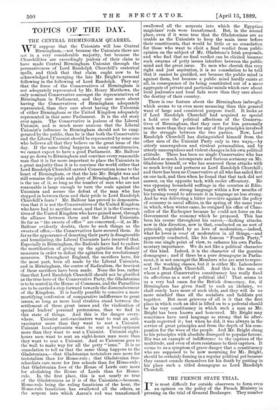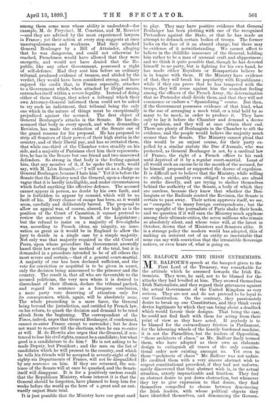THE FRENCH STATE TRIAL.
IT is most difficult for outside observers to form even an opinion on the policy of the French Ministry in pressing on the trial of General Boulanger. They number among them some men whose ability is undoubted—for example, M. de Freycinet, M. Constans, and M. Rouvier —and they are advised by the most experienced lawyers in France ; yet their action at every step suggests at once unscrupulousness and weakness. Had they attacked General Boulanger by a Bill of Attainder, alleging that he was dangerous, and could not otherwise be reached, Frenchmen would have allowed that they were energetic, and would not have denied that the Re- public, like any other Government, possessed a right of self-defence. Had they sent him before an ordinary tribunal, produced evidence of treason, and abided by the verdict, they would have been considered strong, and have enjoyed the credit that, in France especially, attaches to a Government which, when attacked by illegal means, entrenches itself within a severe legality. Instead of doing either of these things, they select a tribunal which their own Attorney-General informed them could not be asked to try such an indictment, that tribunal being the only one which in the nature of things must be exceptionally prejudiced against the accused. The first object of General Boulanger's attacks is the Senate. He has de- nounced that body in every speech, and when demanding Revision, has made the extinction of the Senate one of the grand reasons for his proposal. He has proposed to strip all Senators of their power, of their high status in the country, and of their liberal pay, and has so irritated them, that while one-third of the Chamber votes steadily on his side, and a majority of Parisians elect him their representa- tive, he has in the Senate but one friend and two unavowed defenders. So strong in that body is the feeling against him, that any member of it, if he spoke the truth, would say, with M. Leon Renault,—" I will not sit as a Judge on General Boulanger, because I hate him." Yet it is before the Senate that the Ministry send the General, upon a charge so vague that it is hardly intelligible, and under circumstances which forbid anything like effective defence. The accused cannot appear in person, no doubt by his own fault, and he is forbidden to appear by counsel, which will be no fault of his. Every chance of escape has been, as it would seem, carefully and deliberately barred. The proposal to allow an appeal was, of course, absurd, for high as is the position of the Court of Cassation, it cannot pretend to review the sentence of a branch of the Legislature ; but the refusal to insist on a majority of five-eighths was, according to French ideas, an iniquity, an inno- vation as great as it would be in England to allow the jury to decide in a single case by a simple majority. Not only was that majority required' in the old Court of Peers, upon whose procedure the Government avowedly based their law settling the method of the trial, but it is demanded in a procedure intended to be of all others the most severe and certain,—that of a general court-martial. A majority of one has been declared sufficient, and the vote for conviction or acquittal is to be given in secret, only the decision being announced to the prisoner and the country. The result is, that all who are favourable to the accused politician, the very men whom it is desired to disenchant of their illusion, declare the tribunal packed, and regard its sentence as a foregone conclusion, a mere party vote deserving of attention only for its consequences, which, again, will be absolutely none. The whole proceeding is a mere farce, the General being beyond the jurisdiction, and entitled by French law, on his return, to quash the decision and demand to be tried afresh from the beginning. The correspondent of the Times, indeed, urges that General Boulanger, if condemned, cannot re-enter France except to surrender ; but he does not want to re-enter till the elections, when he can re-enter at will. M. de Blowitz also urges that the General, if sen- tenced to lose his civil rights, cannot be a candidate; but what good is a candidature to do him ? He is not asking to be made Deputy, but President ; and the men on the list of candidates which he will present to the country, and which he tells his friends will be accepted in seventy-eight of the eighty-six Departments of France, will not be disqualified by any sentence on him. If they are returned, the sen- tence of the Senate will at once be quashed, and the Senate itself will disappear. It is for a positively useless result that the Republican Ministry, whose interest it is that the General should be forgotten, have planned to keep him for weeks before the world as the hero of a great and an out- wardly unjust State trial.
It is just possible that the Ministry have one great card to play. They may have positive evidence that General Boulanger has been plotting with one of the recognised Pretenders against the State, or that he has made an attempt to debauch certain bodies of troops. The former looks on the face of it an absurd charge, but there may be evidence of it notwithstanding. We cannot affect to believe in the childlike innocence of the General, holding him rather to be a man of unusual craft and slipperiness ; and we think it quite possible that, though he has devoted himself to no party, but is fighting for his own hand, he has made either Royalists or Bonapartists believe he is in league with them. If the Ministry have evidence of that, they will break his popularity with Republicans ; while if they can prove that he has tampered with the troops, they will rouse against him the soundest feeling among the officers of the French Army, the determination that no Pretender shall divide them, and that they will not commence or endure a " Spaniolising " course. But then, if the Government possesses evidence of that kind, what is the use of arranging a mock trial, or a trial held by so many to be mock, in order to produce it. They have only to lay it before the Chamber and demand a decree of expulsion, and they will at once obtain their end. There are plenty of Boulangists in the Chamber to sift the evidence, and the people would believe the majority much sooner than the Senate. The Ministry cannot plead that this would be an unjust course, for their party ex- pelled by a. similar statute the Due d'Aumale, who was protected, as General Boulanger is not, by a cardinal law of France, the right of a French officer to his rank until deprived of it by a regular court-martial. Least of all would such an excuse lie in the mouth of the accused, for- he himself proposed or supported the decree of expulsion. It is difficult not to believe that the Ministry, while willing to strike, and possibly even obliged to strike, are afraid to strike directly, and are trying to shelter themselves. behind the authority of the Senate, a body of which they are careless, because they know that whether the Bou- langists or the Radicals control the Revision, the Senate is certain to pass away. Their action approves itself, we see, as '• energetic" to many foreign correspondents ; but the more upright of the journalists of Paris shake their heads, and we question if it will earn the Ministry much applause among their ultimate critics, the seven millions who remain so absolutely silent, and whose voice will, at the latest in October, drown that of Ministers and Senators alike. It is a strange policy the modern world has adopted, this of making an autocrat out of an entity so inscrutable that none can say with conviction that the irresistible Sovereign notices, or even hears of, what is going on.



































 Previous page
Previous page